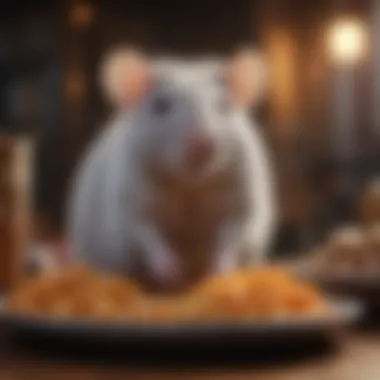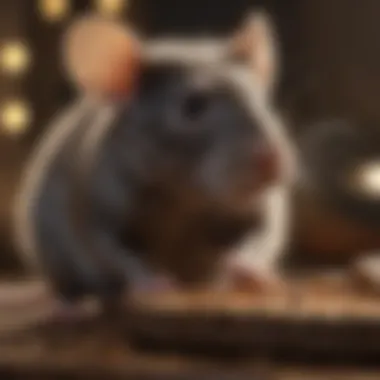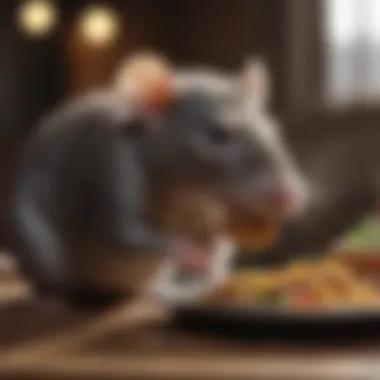Essential Guide to Pet Rat Nutrition and Diet


Intro
Pet rats are intelligent and social creatures. Understanding their dietary needs is crucial for their health and well-being. A well-rounded diet plays a significant role in ensuring that your pet rat thrives. Proper nutrition ensures optimal growth, supports the immune system, and can even prevent various health issues. In this guide, we explore the essential components of pet rat food, including the types of food available, nutritional values, and feeding strategies. By understanding these factors, pet owners will be able to make informed decisions about their pet's dietary needs and overall health.
Understanding Your Pet
A well-understood pet rat has a much better chance to live a healthy and happy life. To start, one needs to acknowledge some fundamental aspects of pet rat behavior and needs.
Pet Behavior Basics
Rats are naturally curious and explore their environment. They engage in activities that reinforce social structures within their groups. Understanding their social dynamics can help you better meet their needs and manage their habits.
Common Breed Characteristics
Different breeds of pet rats may exhibit different characteristics. For example, Dumbo rats have larger ears and a more relaxed temperament, while hairless rats may need extra warmth. Recognizing these traits can assist in better care and environment adjustment.
Species-Specific Needs
Rats require a balanced diet tailored to their specific needs. Young rats have different nutritional requirements compared to adults. Understanding their life stages helps in providing appropriate food selections.
Pet Care and Maintenance
Proper care routines ensure a conducive living environment for your pet rat. This includes feeding guidelines, grooming practices, and hygiene maintenance.
Feeding Guidelines
A balanced diet consists of high-quality pellets, fresh fruits, vegetables, and occasional protein sources like cooked chicken or eggs. Be careful of sugary or fatty treats. Always read the ingredients label.
Grooming Essentials
Though rats groom themselves, occasional assistance is required. Regular brushing helps to remove loose fur and maintain skin health. Also, keep their nails trimmed to prevent discomfort.
Hygiene Practices
Routine cleaning of the cage is essential. Uneaten food and waste should be removed daily. A clean environment prevents the spread of bacteria and ensures a healthier life for your pet.
Health and Wellness
Regular health checks can identify issues early, thereby ensuring better recovery outcomes.
Routine Vet Check-ups
Consulting a veterinarian familiar with rodents is important. Routine check-ups will help track your rat's growth and health status.
Vaccination Needs
While pet rats generally do not have specific vaccination requirements, it is best to have a discussion with your vet regarding preventive health measures.
Recognizing Signs of Illness
Pet owners should monitor their rats for any unusual behavior, such as lethargy, changes in eating habits, or weight loss. Early intervention is crucial for successful treatment.
Enrichment and Activities
Keeping your pet rat mentally and physically stimulated enhances their quality of life.
Indoor vs.
Outdoor Activities
Both indoor and outdoor activities are vital. Indoor activities can include climbing structures or tunnels, while outdoor playtime under supervision can provide new sensory experiences.
Interactive Toys and Games
Rats are clever and enjoy engaging toys. Puzzle feeders or toys that dispense treats will keep them entertained and stimulated.


Socialization Opportunities
Rats are social animals. Try to maintain social connections with other rats, as well as consistent interaction with human caregivers. This reduces stress and increases happiness.
A well-balanced diet and suitable social environment can significantly enhance your pet rat's quality of life.
Understanding the dietary and care needs is paramount for pet owners. With the right information, you can support your pet rat's health and enrich their experiences, leading them to live a fulfilling life.
Prelims to Pet Rat Nutrition
Pet rats are often overlooked when it comes to pet care, yet understanding their nutritional needs is crucial for promoting their health and longevity. The right diet significantly influences a rat's behavior, vitality, and overall quality of life. This section explores the foundational aspects of rat nutrition, emphasizing its importance while also addressing the common misunderstandings surrounding it.
Importance of Nutrition in Rats
Proper nutrition in pet rats has several essential benefits. First, a balanced diet supports the development of healthy bones and teeth. Rats are naturally agile creatures, and a nutritious diet helps maintain their physical capabilities. Additionally, proper nutrition plays a significant role in preventing diseases. Rats that consume a well-rounded diet tend to have stronger immune systems, which can lead to longer lifespans and reduced vet bills.
A rat's diet should incorporate a mixture of items to ensure they receive all essential nutrients. This includes proteins, fats, and carbohydrates, as well as vitamins and minerals. Pet owners must pay attention to these requirements to keep their companions healthy.
Common Misconceptions About Rat Diets
There are many myths and misconceptions surrounding rat diets that can lead to improper feeding practices. One prevalent myth is that rats can eat only seeds or commercially prepared rat pellets. While these can be part of their diet, they must be supplemented with fresh foods, fruits, and vegetables. Another misunderstanding is that rats do not need a varied diet, leading some owners to provide the same food daily. Just like humans and other pets, rats thrive on diversity in their diet.
Some people think that all human food is safe for rats. However, this is dangerous; many human foods, such as chocolate or caffeine, are toxic. Owners must be cautious and research what foods are safe for their pet rats.
It is essential to educate yourself about the nutritional requirements of pet rats to avoid unhealthy feeding habits and potential health issues.
Understanding the essential components of rat nutrition can greatly enhance the bond between you and your pet. It is not only about feeding them but ensuring they lead a healthy and active lifestyle.
Basic Nutritional Requirements
Understanding the basic nutritional requirements for pet rats is essential for ensuring their long-term health and well-being. Rats have specific dietary needs that must be met to support their growth, immune system, and overall vitality. This section outlines the main components that constitute a balanced diet for pet rats. A well-rounded diet is not just about filling a bowl with food; it is about providing the right types of nutrients that contribute to a healthy and active life.
Macronutrients Explained
Macronutrients are the nutrients that are required in larger amounts by rats. These include carbohydrates, proteins, and fats. Each of these play a unique role in the health of your pet rat.
- Carbohydrates: They serve as the primary source of energy for rats. Whole grains, oats, and cereals can provide the necessary energy for daily activities.
- Proteins: These are vital for growth and tissues repair. Rats need a protein-rich diet, which can be met through animal-based sources like cooked eggs or tofu, as well as legumes and nuts. Adequate protein intake supports muscle health and aids growth in young rats.
- Fats: Healthy fats are essential for absorbing fat-soluble vitamins and maintaining overall health. Sources like seeds and nuts can provide these necessary fats, but they should be offered in moderation to avoid obesity.
In summary, macronutrients create the foundation of a rat's diet, ensuring they have the energy and building blocks needed for their bodily functions.
Micronutrients That Matter
While macronutrients are essential, micronutrients are also crucial, even though they are needed in smaller quantities. Micronutrients include vitamins and minerals, which contribute to the well-being of your rat in several ways.
- Vitamins: Vitamin A, B-complex vitamins, C, D, and E are all important. They assist in various physiological functions such as immune response, skin health, and bone strength. A rat’s diet should ideally include fresh fruits and vegetables to meet these vitamin needs.
- Minerals: Calcium, phosphorus, and potassium are vital for bone health, muscle function, and nerve transmission. These minerals must be balanced to avoid deficiencies or excesses which can lead to health issues. A diet rich in leafy greens and certain types of seeds can help achieve this balance.
A well-rounded diet incorporating both macronutrients and micronutrients is critical for maintaining the health of pet rats throughout their life stages.
By understanding these basic nutritional requirements, pet owners can craft a diet that not only meets the energy needs of their rats but also supports their overall health. This knowledge is necessary for preventing common dietary deficiencies and related ailments. It is the foundation upon which a pet rat's happiness and health can thrive.
Types of Food for Pet Rats
Understanding the types of food available for pet rats is crucial for their overall health and well-being. There are several options to consider, each with its own benefits and possible drawbacks. A balanced diet plays a significant role in avoiding dietary deficiencies that can affect a rat’s health. By providing quality food, pet owners can promote longevity and well-being in their furry companions.
Commercial Rat Food Options
Commercial rat food often comes in pellet or block forms. These formulations generally provide a balanced ratio of essential nutrients, which makes them a convenient option for pet rats. Many brands, such as Oxbow Essentials Rat Food and Harlan Teklad Rat Diet, offer specific nutritionally formulated options suited for pet rats.
However, it is important to evaluate the ingredients listed. Some products may include fillers or artificial additives that provide little nutritional value. A good commercial rat food should contain a balance of proteins, fats, carbohydrates, vitamins, and minerals. Regularly reviewing and choosing high-quality commercial food can help ensure your rat's diet remains balanced.
Homemade Diets: Risks and Benefits
Preparing homemade diets for pet rats can be rewarding, but it carries certain risks. On one hand, custom diets allow owners to control all ingredients. This can help in catering to a rat's preferences and special needs. On the other hand, it requires a strong understanding of rat nutrition.
Rats require a variety of nutrients for their health. Without careful planning, a homemade diet might lack essential vitamins or minerals. Research is vital before transitioning to a homemade option. It's wise to consult with a veterinarian to ensure that the diet meets recommended nutritional guidelines. If executed well, homemade diets can offer fresh, nutrient-rich meals that may appeal to the rats more than commercial foods.


Fresh Foods to Include
Incorporating fresh foods into a pet rat's diet is highly beneficial. Fruits and vegetables can provide essential vitamins and minerals while adding variety to their meals. Safe options include leafy greens like spinach and romaine lettuce, as well as fruits like apples and bananas, always offering them in moderation.
Some other valuable fresh foods include:
- Carrots - Good source of beta-carotene.
- Broccoli - Rich in vitamin C and other nutrients.
- Berries - Low in sugar, high in antioxidants.
Fresh foods should be introduced gradually, allowing rats to adapt. Avoid toxic foods such as citrus fruits and any prepared or processed human foods that may come with additives. Fresh foods serve not only as a nutritional boost but also as an engaging activity for rats, encouraging natural foraging behaviors.
Important: Always wash fresh fruits and vegetables thoroughly to remove any pesticides or contaminants.
In summary, selecting appropriate food types plays a major role in a pet rat's health. Understanding the options available, along with their potential benefits and challenges, allows pet owners to make informed choices. A well-balanced diet is essential to promote the happiness and longevity of these social creatures.
Feeding Strategies for Optimal Health
Feeding strategies play a critical role in ensuring the well-being of pet rats. A well-planned feeding approach can enhance their health, prolong their life, and reduce the risk of diet-related diseases. Pet owners must understand various aspects of feeding that contribute to optimal health.
Portion Control and Frequency
Proper portion control is essential in maintaining a healthy weight and preventing obesity in pet rats. These small animals have unique energy requirements based on their age, size, and activity level. Overfeeding can lead to numerous health issues, including diabetes and fatty liver disease.
Determine the right portion size by considering the following factors:
- Age: Young rats may require more frequent meals due to their growth needs.
- Weight and Activity Level: Active rats need more food compared to less active ones.
- Type of Food: Commercial rat food often provides guidance on portion sizes. Follow these recommendations as a starting point.
Feeding frequency is another key aspect. Rats typically benefit from multiple small meals spread throughout the day. This mimics their natural behavior, as they are more inclined to forage and nibble rather than consume large meals at once. Aim to feed your pet twice a day, adjusting based on their needs and preferences.
Monitoring Food Intake
Regularly monitoring your pet rat's food intake is vital for their overall health. Understanding how much your rats eat can help you identify potential health issues early on. Changes in eating habits can signify underlying health problems or stress.
To effectively monitor food intake:
- Consistent Feeding Schedule: Establish a routine and observe how much food is consumed at each feeding.
- Check Food Leftovers: Assess how much food remains after each meal. If you notice an increase in leftovers, it might indicate illness or lack of appetite.
Additionally, maintain a food diary to track patterns over time. This is particularly useful to share with a vet if any health concerns arise.
Remember: Rats thrive on routine. Keeping their feeding habits consistent plays a crucial role in their psychological well-being.
In summary, adopting well-thought-out feeding strategies enhances the opportunity for a long, healthy life of your pet rats. Portion control, feeding frequency, and monitoring food intake all contribute to their nutrition and overall health.
Special Considerations for Different Life Stages
Understanding how the dietary needs of rats change throughout their life is crucial for pet owners aiming to optimize their health. Rats experience various stages, each requiring specific nutrients and dietary elements. Ignoring these needs can lead to health issues or developmental problems. Therefore, recognizing how to adapt their diet at each life stage enhances their quality of life and longevity.
Diet for Baby Rats
Baby rats, also known as pups, have particular dietary requirements due to their rapid growth and development. They are usually weaned at about three to four weeks old, transitioning from their mother’s milk to solid foods. During this phase, a high-protein diet is essential. Proteins support muscle development and overall growth.
A suitable commercial rat food specifically designed for young rats should contain high levels of protein, around 14-20%. This can be supplemented with soft foods like cooked grains and high-quality, low-fat baby food. It is also advised to provide fresh fruits and vegetables in moderation to introduce them to different flavors and textures.
Ensuring clean water is accessible is important, as hydration promotes healthy digestion and metabolic function.
Nutritional Needs for Adult Rats
As rats mature into adulthood, their dietary requirements shift slightly. Adult rats generally need a balanced diet comprising 12-14% protein. Proper nutrition for adult rats helps maintain weight, energy levels, and overall health.
High-quality commercial rat food should remain the core part of their diet, but it can be diversified with the addition of fresh foods. Leafy greens, such as kale or spinach, can be good options, along with certain fruits like blueberries or apples. Flexibility in their diet is beneficial; however, it is key to avoid foods that are overly high in sugars or fats.
Moreover, it's important to monitor weight during this stage. Regular exercise, such as playtime outside the cage, should complement their diet for optimal health.
Dietary Changes for Senior Rats
Older rats face unique challenges that require more attention to their diet. As rats age, they may experience dental issues or decreased metabolism. Therefore, a softer diet might become necessary as chewing harder foods becomes difficult. A diet that is easy to digest and low in fat will help support their declining health.


For senior rats, consider incorporating more soft, high-quality pelleted food or moistened kibble. Additionally, frequent small meals can be more manageable than larger ones. Supplements, such as omega-3 fatty acids or glucosamine, can support joint and coat health during this stage.
Regular health check-ups also become essential as they age, ensuring any dietary issues are swiftly addressed. Providing an enriching environment can also play a role in their overall wellness.
Potential Dietary Hazards
Understanding potential dietary hazards is essential for pet rat owners. Even though rats are generally resilient creatures, their diets should be carefully managed. The importance of recognizing harmful foods and allergens cannot be overstated. Potential dietary hazards can greatly affect your pet's health. Ignoring these can lead to severe health issues, including toxicity or allergies. It is crucial to differentiate between safe and harmful food items.
Foods to Avoid
Certain foods can pose significant risks to pet rats. Here are some that should be strictly avoided:
- Chocolate: Contains theobromine, which is toxic to rats.
- Caffeine: Found in coffee and tea, it can cause hyperactivity and heart problems.
- Onions and Garlic: These can lead to blood cell damage.
- Citrus Fruits: While some rats tolerate them, they can cause upset stomach in others.
- Raw Beans: Contain toxins harmful to rats unless cooked thoroughly.
- Sugary or Fatty Foods: High sugar and fat can lead to obesity and diabetes.
Pet owners should always double-check the safety of new foods before introducing them to their rat's diet. Note that some rats may react differently, so careful observation is needed.
Identifying Allergic Reactions
Rats, like any other pets, can develop allergies to certain ingredients in their food. Identifying these reactions early on is important for their well-being. Symptoms of an allergy may include:
- Itching or Scratching: Persistent scratching may indicate skin irritation.
- Swelling: Observe any swelling around the face or paws.
- Respiratory Symptoms: Coughing, wheezing, or difficulty breathing are critical signs.
- Digestive Issues: Diarrhea or vomiting can indicate a food allergy.
If you notice any of these symptoms after introducing a new food, consult a veterinarian immediately. Performing a food elimination diet can help pinpoint the exact allergen. Always keep a watchful eye on your pet's health as they sample different dietary options.
Regular monitoring of your rat’s health and diet is vital in preventing adverse reactions.
Myths About Pet Rat Foods
Understanding the myths about pet rat foods is crucial for pet owners who want to ensure their rats receive the best care. Many misconceptions exist about what constitutes a healthy diet for these small animals. These misconceptions can lead to serious health issues if not addressed. Clarifying these myths helps pet owners make informed dietary choices, ultimately promoting the well-being of their furry companions.
Debunking Common Myths
One prevalent myth is that rats can eat human food without restrictions. This belief overlooks the nutritional needs specific to rats. While some human foods can be safe in moderation, many are unsuitable or even toxic. For example, foods high in sugar or salt should be avoided. Additionally, not all fruits and vegetables are safe for consumption. Knowing which foods are safe is essential.
Another misconception is that pet rats can thrive on only one type of food, often commercially available rat pellets. While these pellets provide a base diet, they do not offer the complete nutritional profile that rats need. A varied diet that includes fresh fruits, vegetables, and grains is necessary for optimal health. Rats are omnivores, and they benefit from diverse food sources.
Moreover, some people believe that pet rats do not need to chew as much as they do. This is incorrect; chewing is vital for dental health. Rats' teeth grow continuously, so they require hard items to gnaw on. Providing appropriate chew toys or safe items can help prevent dental issues.
Understanding Rat's Chewing Habits
Rats have a natural instinct to chew, which serves important functions. Firstly, it helps to maintain their dental health. Rats' teeth grow constantly, and chewing prevents them from becoming too long. This can lead to serious complications if left unchecked. Some owners may not understand the significance of this behavior.
Besides dental care, chewing also provides mental stimulation. Rats are intelligent creatures, and they require engagement to prevent boredom. Simple chew toys made from safe materials can entertain them and keep their minds active. Good options include cardboard, untreated wood, or specific chew toys designed for small pets.
To support this behavior, owners should incorporate chew items into their pets' environment. This will not only satisfy their natural instincts but also protect household items from being chewed on. Ensuring a balanced diet along with proper chewing items contributes to a healthier, happier pet rat.
Proper nutrition for pet rats goes beyond avoiding myths. It includes understanding their natural habits, like chewing, which are critical for their happiness and health.
Culmination
In this article, we have comprehensively explored the critical aspects of pet rat nutrition. Understanding the dietary needs of rats is vital for their health and longevity. A well-rounded diet contributes to improved well-being and behavior, while a lack of proper nutrients can lead to serious health issues. The significance of this conclusion lies in the retention of key dietary elements, ongoing management of feeding practices, and recognition of the continual adjustment required during different life stages.
Recap of Nutritional Essentials
A proper diet for rats must include a balance of macronutrients and micronutrients. These components are fundamental:
- Carbohydrates: Provide energy and support daily activities.
- Proteins: Essential for growth and repair of tissues, especially crucial for young and pregnant rats.
- Fats: A source of concentrated energy, necessary in moderation.
- Vitamins and minerals: Vital for various bodily functions, from bone health to immune response. Different food options should be closely evaluated to ensure they meet these needs sufficiently.
Recognizing the appropriate portion sizes and frequency of feeding further enhances the effectiveness of these dietary components. Monitoring food intake is also important to avoid health problems related to overeating or neglecting essential nutrients.
Final Thoughts on Pet Rat Diets
Maintaining a healthy diet for pet rats is not merely about choosing the right food. It involves an understanding of their unique needs and behaviors. Pet owners must be proactive in educating themselves about the risks and benefits associated with different food types. This is crucial in counteracting prevalent myths surrounding rat diets.
In summary, be aware that:
- Different life stages require specific dietary adjustments.
- Regular assessment of dietary habits can promote long-term health.
- Engaging with resources and communities, such as reddit.com or facebook.com, can provide additional support and insight.
By fostering a knowledgeable and attentive approach to pet rat nutrition, owners can ensure their companions remain healthy and thrive.
"A well-informed owner leads to a thriving pet."







